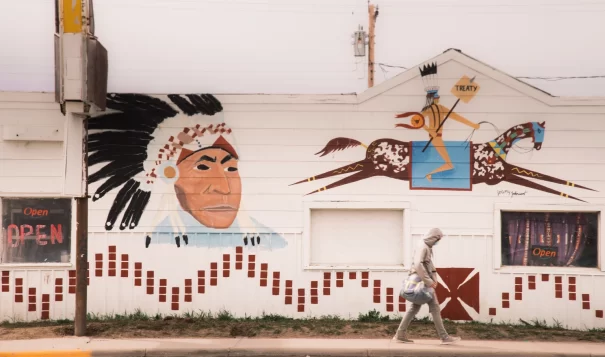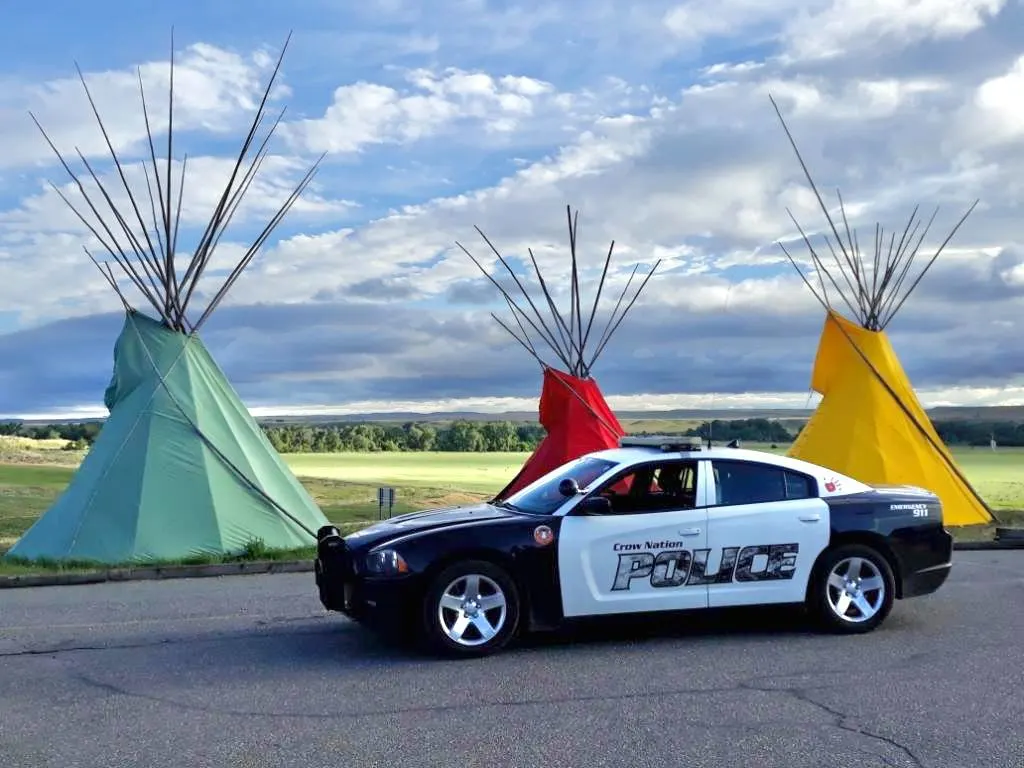News Based on facts, either observed and verified directly by the reporter, or reported and verified from knowledgeable sources.
Calls for Congress to fund law enforcement on tribal land
 A mural on a building in Browning, Montana which is on the Blackfeet Indian Reservation (Tony Bynum | Kaiser Health News).
A mural on a building in Browning, Montana which is on the Blackfeet Indian Reservation (Tony Bynum | Kaiser Health News).
A joint resolution heard in committee Tuesday in Montana seeks to press Congress and the federal government to fully fund public safety and law enforcement agencies, and services on reservations in Montana as one tribe says its funding has barely increased in 25 years.
In addition to pushing Congress for full funding, the resolution, SJ5, calls on the U.S. Department of Justice to work with tribes to figure out how to best fund their law enforcement, courts, detention facilities, people who need attorneys, victims and juvenile services, rehab and reentry programs and crime prevention programs.
“It is a reality that tribal law enforcement, public safety and judicial systems are greatly underfunded in Indian Country,” said Patrick Yawakie, testifying in favor of the measure on behalf of the Blackfeet Reservation.
The measure, sponsored by Sen. Bob Brown, a Trout Creek Republican, also calls on each of Montana’s tribal governments and Republican Gov. Greg Gianforte to adopt and send their own similar resolutions to the U.S. Congress and the Montana Secretary of State’s Office by June 30.
Brown told the Senate Judiciary Committee Tuesday the measure came out of the time he spent on the interim State-Tribal Relations Committee and his visits to every reservation in the state.
Five people who represented reservations or law enforcement on reservations, including the Fort Belknap and Blackfeet reservations, testified in favor of the measure, saying they are severely underfunded and need more federal money to support law enforcement and public safety programs in the face of increasing crime.

Josh Roberge, the chief of police for the Fort Belknap Indian Community, said the lack of funding could be tied directly to issues there and on reservations not directly run by the Bureau of Indian Affairs.
“We’re low on manpower, overrun with crime. We’re run ragged over there,” he said. “And it’s directly correlated to funding from the federal government.”
Roberge said while most every law enforcement agency in Montana is dealing with increased crime rates in their jurisdictions, law enforcement there is struggling more because it lacks the funding needed to hire and retain officers.
“Because of our wages, our benefits and all that, we’ll get an officer poached to another department because we don’t have the funding to maintain anything,” he said.
Geno LeValdo, an at-large Gros Ventre council member on the Fort Belknap Indian Community Council who testified at the hearing, said in an interview afterward that the police department there has four officers on staff – two of whom were in Helena on Tuesday to testify.
He said that is about one officer for every 1,000 people on the reservation and that some public safety officials are now carrying weapons for protection.
And though the reservation has applied for grants and for extra funding from the BIA and Office of Justice Services, and received single-use money that could not be used for firearms or salaries, he says those funding requests have not come through, and wages for officers have not been able to keep up with inflation.
“I mean, nobody wants to get shot for as little as these guys make,” LeValdo said.
The reservation sued the Department of Interior, the Interior Secretary, and BIA officials in October in the U.S. District Court of Montana after it was denied a $3.8 million request for increased funding – from $1.3 million to $5.2 million – citing law that says the money is subject to what is available for appropriations and cannot be taken from other tribes.
According to a federal sworn affidavit from Gary Lamere Jr., a criminal investigator on the reservation who also testified at Tuesday’s hearing and who worked previously as a special agent for BIA, the reservation received around $1.2 million for law enforcement and public safety in 1997, which funded 16 employees.
The affidavit said the current budget funds only a fraction of that, with most of the employees within Fort Belknap Indian Community law enforcement receiving between 50 percent and 70 percent of the wages a person in the same position at a BIA department would make.
The lawsuit says, and citizens of Fort Belknap said Tuesday, that because of the low funding, they cannot hire a victim specialist, drug investigator, K-9 officer, school resource officer, or a Missing and Murdered Indigenous Persons special agent as they would like.
The lawsuit claims federal authorities breached contract with the tribe as well as its fiduciary duty and requests monetary damages. It also asks for a declaratory judgment, saying the defendants violated their obligations by not “adequately” funding law enforcement services to protect public safety on the reservation. It is asking a judge to force the government to supply those funds.
“This should have been done 15 years ago,” LeValdo said. “It opened up everybody’s eyes and we’re so happy.”
Brown’s measure comes as Lake County moves to withdraw from a decades-long agreement with the state over law enforcement funding on the Flathead Reservation and as a bill that would require the state to provide funding under that law, Public Law 280, is set for a hearing next week.
Brown said though he knows resolutions are often referred to as “letters to Santa Claus” in the legislature, he feels that “for a long time, the tribes, in their stockings, they’ve been getting lots of coal from Santa Claus.
“And in this case, Santa Claus is the federal government,” he said. “The federal government has got money to send billions of dollars to other countries, but not live up to their obligations here at home.”
This article was first published in the Daily Montanan.
